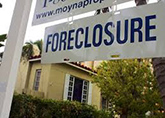FORECLOSURE TSUNAMI EXPECTED – PROTECTING YOUR HOME WHEN YOU HAVE TENANTS
 It has been so heartbreaking to me, being among one of less than a handful of attorneys regularly seeking to help homeowners who face foreclosure. The Banks have an Army of lawyers. Close to eight million lost their homes as a result of the Recession of 2007 and 2008. The Banks and Wall Street were bailed out by the Federal Government; Main Street was not.
It has been so heartbreaking to me, being among one of less than a handful of attorneys regularly seeking to help homeowners who face foreclosure. The Banks have an Army of lawyers. Close to eight million lost their homes as a result of the Recession of 2007 and 2008. The Banks and Wall Street were bailed out by the Federal Government; Main Street was not.
As bad as it has been, it is expected to be worse as a result of Covid. With roughly twenty-five percent of the workforce without jobs, a staggering 25%; the depletion of savings, food lines and other indicators, the experts expect even worse foreclosure rates, when the mortgage stays are lifted. Living with the Law will continue to provide important information to its readers as you face a foreclosure future that may rival the Great Depression. This is one of a series of articles we will share with you.
My experience suggests to me that when a homeowner has tenants, renting all or part of a property, Mortgagors will systematically and continually interfere in a tortious way with the rental business practices of the homeowner, preventing him or her from maintaining the property as a tenant occupied property. Tenants, upon whose rental income the homeowner depends, are often induced or coerced to vacate their units within the subject property. By so doing, the homeowner 1) loses substantial and significant income; 2) is unable to secure financing, despite attempts, to pay off the alleged debt to the Banks; and 3) is left less able to secure a loan modification, the Court’s preferred outcome of foreclosure matters.
Within the District of Columbia, tortious interference involves a third party disrupting an existing business relationship or contract between two or more parties. There are two main types of tortious interference —tortious interference with prospective business relations or tortious interference with contract. If tortious interference is proven, the wronged parties are entitled to recover damages for tortious interference. In order to prevail in a tortious interference claim, the homeowner is required to prove certain elements existed. In a tortious interference with contract claim, the elements are:
- A valid contract exists;
- The third party (The Bank) was aware of the contract;
- There was an unjustified and intentional interference by the third party; and
- The homeowner suffered damages due to the Bank’s actions.
Even if there is no contract, a tortious interference claim may be possible if there was an expectancy for a business contract to develop. To make out a prima facie case of intentional interference with business relations, the homeowner must prove: “(1) existence of a valid contractual or other business relationship; (2) the Bank's knowledge of the relationship; (3) intentional interference with that relationship by the Bank; and (4) resulting damages. One who intentionally and improperly interferes with the performance of a contract between another and a third person by inducing or otherwise causing the third person not to perform the contract, is subject to liability to the other for the pecuniary loss resulting to the other from the failure of the third person to perform the contract”.
To be actionable, the interference need not cause an actual breach of the business relationship, but instead may cause “merely a failure of performance” by one of the parties, due to the Bank’s interference, for a protracted period of time; the homeowner has not been able to fully collect rent, for example.
The D.C. Court of Appeals has reversed dismissal of a complaint for intentional interference with business relations where a commercial tenant alleged that the landlord improperly refused to consent to a sublease “that fully protect[ed] the landlord's bargain under the prime lease.” “If it is established that the [landlord] withheld its consent merely to ‘leverage’ a better bargain for [itself], that would constitute intentional interference with either a contract or business expectancy.”
The damages can be varied based on each situation. The homeowner may be entitled to recover compensatory damages, and, in some instances, they may be awarded punitive damages.
Compensatory damages are financial damages and include:
- Lost profits
- Expenses
- Contracts awarded, but no work was completed
- Partially completed project costs
- Loss of promised future contracts
- Damage to the homeowner’s reputation
- Permanent destruction of business relationship
In some situations, the homeowner may be able to prove that the defendant acted in a manner that was so repugnant and outrageous that he or she is entitled to recover punitive damages. Reckless disregard or malicious intent are two elements that could lead to an award of punitive damages.






